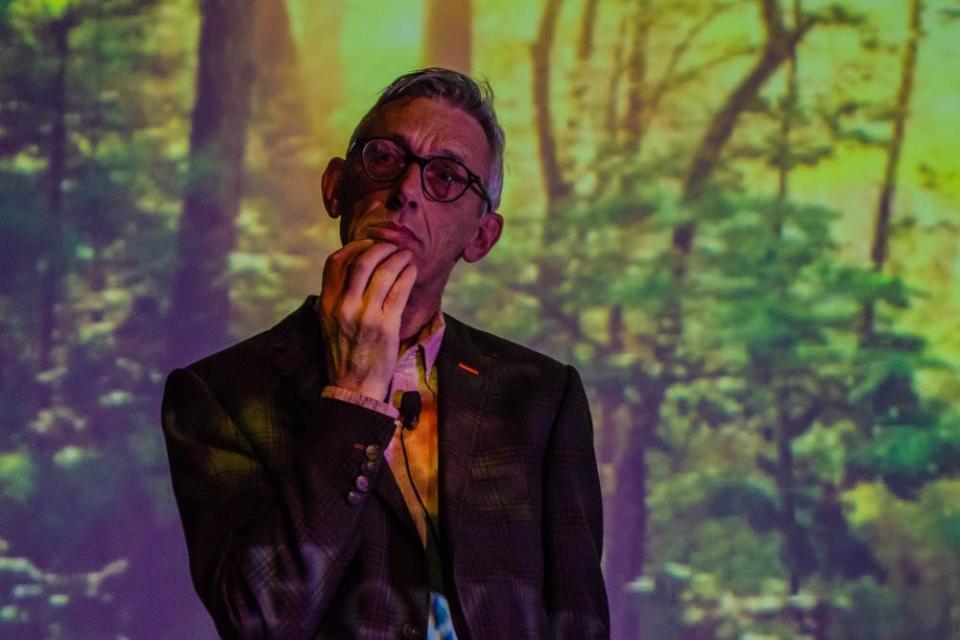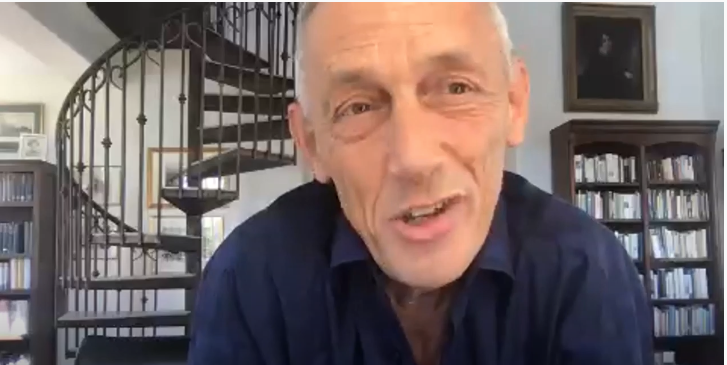Sir Jonathan Bate, Foundation Professor of Environmental Humanities (Literature)
Green thumb: A former Oxford prof brings eco-innovation to the desert
After spending part of spring semester 2019 here on the Tempe campus as distinguished visiting professor—where he co-taught (with Professor Mark Lussier) the English course, “Environmental Issues in Literature & Film”—Sir Jonathan Bate has made ASU his permanent academic home.
Bate joined ASU last fall as a Foundation Professor of Environmental Humanities, with a joint appointment in the Department of English and the Global Futures Laboratory / School of Sustainability. He retains a position as senior research fellow at Oxford University.
It was an absolute coup for ASU to recruit Bate, who is an international leader in green thinking and applied humanities. A renowned Shakespearean and eco-critic, Bate combines scholarly expertise in sustainability with Renaissance literature, Romantic literature, biography and life-writing, contemporary poetry, visual culture and theater history. In 2015, Bate became the youngest person ever to be knighted for services to literary scholarship.
Bate said that he was drawn to ASU by its innovative transdisciplinary approach: “Having come to the end of an exciting but exhausting eight-year term leading a college in one of the oldest universities in the world, I felt that I needed a very different environment to develop the next phase of my teaching and writing. Where better than ‘the New American University,’ which genuinely feels like the future, not the past? I published my first book of literary ecocriticism 30 years ago, and yet, frustratingly, there is very little interest in environmental humanities in traditional British universities such as Oxford, whereas here there are colleagues advancing so many different dimensions of the work of using the humanities to address the crisis of sustainability.”
Bate not only works to promote literature within academia’s “hallowed halls,” he is also deeply committed to humanities for the public good. From 2017 to 2019 he served as Gresham Professor of Rhetoric, offering free public lectures in the city of London, and delivering two free “MOOCs” (massive online open courses): Shakespeare and his World and Literature and Mental Health: Reading for Wellbeing. The latter course is part of the work of the charitable foundation that he assisted his wife, the author and Jane Austen scholar Paula Byrne, in bringing into being, ReLit: The Bibliotherapy Foundation.
Here in the desert, as the spread of the coronavirus forced universities online and states issued “stay-at-home” orders during spring 2020, Bate participated in a virtual Department of English colloquium series, presenting, “Fiction as Prediction.” The talk, which asked whether the role of literature in global futures might be to act as a “canary in a coal mine,” dovetailed with Bate’s important piece on reading “plague literature” which was published in the venerable British medical journal, The Lancet.
In May, Bate good-naturedly delivered the address for Department of English graduates and award-winners at a virtual ceremony, adapting words of Walt Whitman to address ASU’s student “pioneers”:
All the past you leave behind,
You debouch upon a newer mightier world, varied world,
Fresh and strong the world you seize, world of labor and the march,
Pioneers! O pioneers!
It is clear that the also-pioneering Bate has embraced his adopted home. So, how has the adjustment been? “I’ve been given such a warm welcome,” he says, “and it was especially encouraging to get terrifically positive student feedback on a course on ‘Society and Sustainability’ which has usually been taught using a social science model, but which I reconfigured with a strong humanities emphasis.”
And, of course, the million dollar question: what do he and his family think of the desert and the scorching Arizona heat?
“We all love the big blue skies—England is so grey—and we’re very lucky to have found a beautiful house in the McDowell Mountains, where the air is a little clearer. Tom and Ellie, our two older children, have enrolled at ASU and are really impressed with [the] teaching—though lockdown has been frustrating their social lives!”
Aside from acclimating to a new country amidst a pandemic and global social unrest, Bate has—of course!—been busy producing scholarship. Most recently, he published the biography, Radical Wordsworth: The Poet Who Changed the World (2020) in both U.K. and U.S. editions. The book has received rave reviews in The Guardian, The Times of London, The Irish Times, and London Review of Books.
Bate has been making the virtual circuit to promote the work, launching a BBC Radio 4 series earlier in the spring called “In Wordsworth’s Footsteps,” for which Bate broadcast—pre-pandemic—from key locations important in the life of William Wordsworth. He also appeared in the Hay Digital Festival in late May.
His current projects are a short “parallel life” of F. Scott Fitzgerald and his favorite author, John Keats, and a longer book provisionally called The Sacred Earth: Religion, Art and the Fate of the Planet.
Image 1: Sir Jonathan Bate speaks during a lecture at the Marston Exploration Theatre at ASU in January 2019. Photo by Imani Randle / The State Press.
Image 2: Bate leads a lecture on the the apocalypse myth and the repercussions of this on modern climate issues at Changing Hands Bookstore in Phoenix, February 2019. Photo by Marcus Chormicle / ASU Now.
Image 3: Screenshot of Bate delivering the virtual address for 2020 graduates and award-winners of the Department of English at ASU.



